Almost 125 years ago – from Port Lincoln and Quorn through to Port Pirie, across Angaston to North Adelaide, then Semaphore, and on to Naracoorte - more than 11,600 South Australian women, and men, banged on patriarchy’s door demanding women be given the right to vote.
These largely unknown pioneers penned their names to a petition described by records as a “monster” document never before seen in State Parliament.
It was 30m long when it was finally tabled as the Women’s Suffrage Petition in August 1894.
“It was extraordinary,” says South Australian Equal Opportunity Commissioner Dr Niki Vincent.
She says the task of collecting thousands of signatures across the state by the first suffragists such as Catherine Helen Spence, Mary Colton and Mary Lee should not be understated.
DID YOU FAMILY SIGN? SEARCH THE 1894 PETITION BELOW
“Eleven thousand signatures would have been a phenomenal number of names to collect with such a small population at the time and there would have been many detractors,” Ms Vincent says.
The courage and conviction of those petitioners – and the legendary women who fought for change for three decades before them – made world-first headlines in December 1894 when the South Australian Parliament passed the Constitution (Female Suffrage) Bill.
It was approved by Queen Victoria in February 1895 because the Governor, the 9th Earl of Kintore, did not support the Bill and felt it was too momentous a constitutional change for him to sign.
The new law not only made SA the first colony in Australia to give women the right to vote but, quite accidentally, made them the first in the world to gain the right to stand for election.
It also led women across the colony to begin a generational momentum of female firsts being celebrated and documented by the Sunday Mail and The Advertiserin the launch of the Ceiling Smashers campaign tomorrow to mark the 125th anniversary this year.
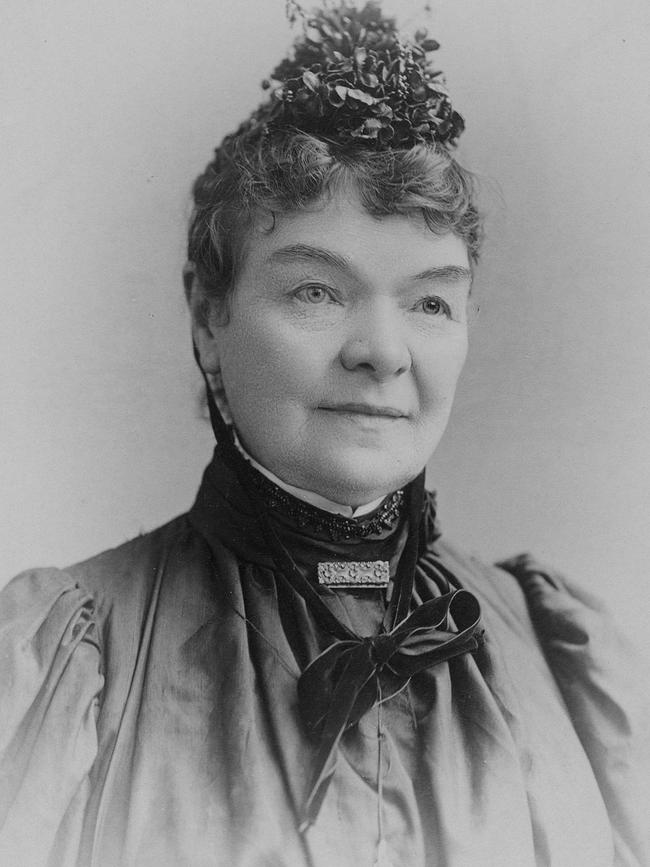
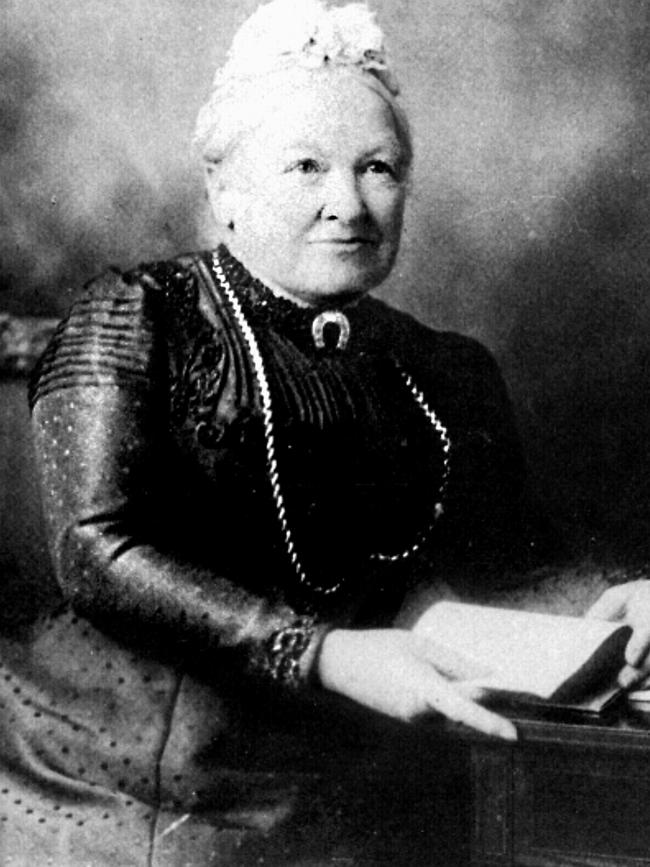
Readers will be able to discover if their forebears were signatories on the historic Women’s Suffrage Petition at advertiser.com.au today.
“It was an accidental outcome of the Bill that led SA to make world history,” says Adelaide University visiting research fellow Dr Jenny Stock.
Dr Stock says the draft Bill was amended a number of times in an attempt to kill the legal push for women’s right to vote.
“Some wanted to risk the Bill so they amended it to include women’s right to run for Parliament in the hope it would not pass,” she says.
The history-making Bill led to a political watershed nationally with Western Australia giving women voting rights in 1899 and New South Wales in 1902 – as did the Commonwealth.
SA remains a paradox although as it remains the only state or territory without ever having a female premier.
And it was only last year that the state recorded its first female attorney-general.
Since 1894, about 60 women have become state MPs of a total 889 members – a 7.3 per cent representation.
And it wasn’t until 24 years after the Bill was passed that a woman, Selena Siggins, stood for Parliament in SA in 1918, and a further 41 years before two women, Jessie Cooper and Joyce Steele, were successfully elected in 1959.
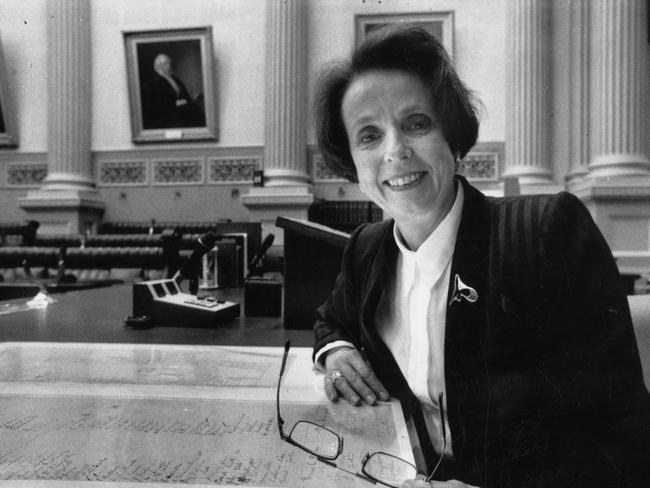
“It’s a little bit different now – it’s still hard for women in politics but attitudes have changed somewhat,” former Labor MLC Anne Levy says.
The 84-year-old was elected in 1975 – the fourth women ever in SA. She served for 22 years and was a minister in the Bannon and Arnold governments.
In 1986, she became president of the Upper House – the first woman presiding over a House of Parliament in Australia.
“We were such a rarity. We tended to be ignored,” Ms Levy says.
“I can recall occasions in caucus meetings and I put my hand up with a resolution and nobody took the slightest bit of notice. Yet about a minute later, one of the guys put their hand up and gave the same solution and everyone thought it was a great idea.”
Ms Levy played a pivotal role in the development of the Sex Discrimination Act (1976). She has also been recognised for her work in abortion law reform, voluntary euthanasia, family planning, decriminalisation of homosexuality, criminalisation of rape in marriage and decriminalisation of prostitution.
She entered politics aged 40.
“When I was preselected for the Legislative Council I’d been a candidate twice before in electorates I had no hope of winning and it was made very clear to me that I was only preselected because my children were at high school,” Ms Levy said.
“If I still had children at primary school I would have been accused of neglecting them.
“I’m not saying it’s easy for women now but it’s much, much fairer than it was before.”
There are currently 19 female MPs in the SA Parliament, making up 28 per cent of all members. Women members represent about 32 per cent of Federal Parliament, placing Australia 50th in the world. Rwanda is at the top.
Australia was one of the last nations to elect a female leader when South Australian Julia Gillard became prime minister in 2010. As more women enter upper and lower houses across the nation, the issue of female under-representation in politics and the reasons for it have become more of a public talking point.
Ms Gillard’s misogyny speech in 2012 – reacting against alleged sexism from opposition leader Tony Abbott – made global headlines.
In the past year, female MPs have resigned amid allegations of bullying and unequal treatment. And the unfair treatment of former deputy prime minister and foreign affairs minister, SA-born Julie Bishop, by her own WA colleagues has also received wide coverage.
While gender parity still appears far off, state Liberal MLC and Human Services Minister Michelle Lensink says much has been achieved.
“We have come a long, long way,” says Ms Lensink, chairwoman of the joint state parliamentary committee on the 125th anniversary of women’s suffrage.
She looks back at the isolation of one of her mentors, former MLC Diana Laidlaw, and laments.
“She would have been the sole voice in the party representing women and women’s issues – that would have been hard to comprehend,” Ms Lensink says.
Ms Lensink, who was the deputy Liberal leader of the Upper House from 2008-2017, was the first female serving member of the Legislative Council to have a baby.
Today, she shares the Cabinet with SA’s first female Attorney-General, Vickie Chapman.
Ms Chapman says diverse representation is critical for robust democracy, and SA’s pioneering suffragettes must be acknowledged for the critical role they played in SA’s strong sense of social equality.
“I strongly believe in the adage that ‘If she can’t see it, she can’t be it’,” says Katrine Hildyard, opposition spokeswoman for the status of women. “If girls and women can see what is possible and that they have a place in our Parliament and, indeed, in any other aspect of life that they want to participate in, then they are equally encouraged by what they see to choose that pathway,” she says.
Federal Labor MP Kate Ellis, who is retiring from Parliament to be more present with her two young sons, says the suffragettes forged a path still benefiting many of society’s most marginalised.
“In my 15 years in Parliament I’ve seen us fight to progress women’s opportunities by things like introducing paid parental leave, domestic violence leave, increased childcare subsidies, a strengthened agency dedicated to gender equality in the workplace and increased funding for women’s health issues,” she said.
“So many issues – including a national plan to reduce violence against women – that had been ignored for too long, and women fought in Parliament to deliver.”
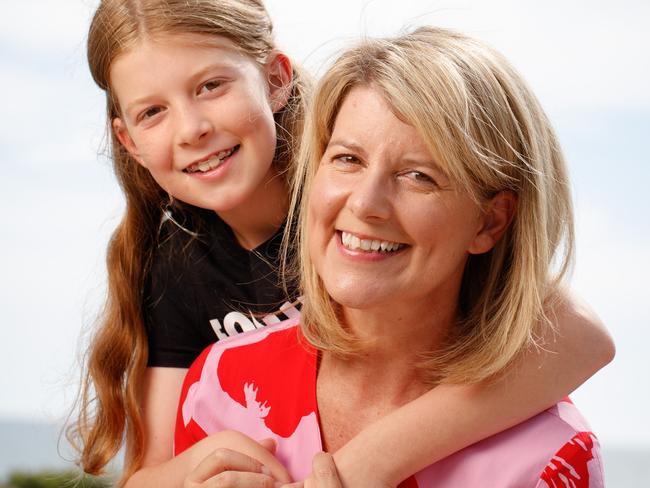
Dream of no barriers for our daughters
Natasha Stott Despoja was a 26-year-old South Australian woman who believed she’d cracked the political glass ceiling in 1995.
She was the youngest woman to enter Federal Parliament and felt she was on the cusp of a revolution of ceiling smashers.
“I was realistic that change would take time but I’m still stunned at how long it’s taking,” she says.
The former federal Australian Democrats leader and senator was among a female cohort who made up just over 14 per cent of all parliamentary representatives 24 years ago.
She says she had hoped equal representation would have been reached by the time she retired from Parliament in 2008 to raise a family.
“I’ve certainly witnessed a boost in the number of women entering politics and I assumed that trajectory would continue, but it didn’t,” she says.
“Instead, in some recent elections we saw a reversal of that trend. That our Federal Parliament has only just hit the internationally recognised level of critical mass for women in politics (31 per cent) in the 21st century is a travesty.”
Ms Stott Despoja says while the 125th celebrations of SA’s world-leading suffragists this year is great cause for celebration, barriers to political life still remain for women and must be addressed.
She says sexism, judging women by what they wear not by their policies and reform, and unequal media scrutiny of female politicians are still significant turn-offs for those wanting a career in politics, as is the exhaustive travel requirements and the continuing domestic burden they carry compared to men across all working sectors.
“It’s wrong to suggest it’s become harder for women in politics because there has been progress – albeit small – but I would have thought that we would have achieved parity by 2019,” Ms Stott Despoja says.
Now, as a mum to 10-year-old Cordelia, Ms Stott Despoja hopes her daughter does not need to wait a further 24 years to witness a gender-balanced Australian Parliament.
“Momentum is gathering – people want to see our gender difference reflected and represented. It will happen,” she says.
Ms Stott Despoja is the current chairwoman of Our Watch and next month launches her book Our Violence highlighting the blight of domestic violence in Australia.
(Picture of Attorney-General Vickie Chapman with the 1984 petition in the Parliamentary Vault was used with the permission of Speaker Vincent Tarzia).

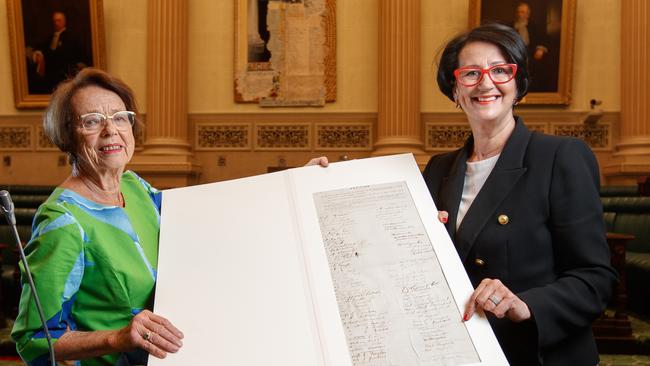
Add your comment to this story
To join the conversation, please log in. Don't have an account? Register
Join the conversation, you are commenting as Logout
Battle to save animals on the brink at Outback reserve
Conservationists are battling to save animals at an Outback reserve from the effects of the worst drought in recent memory, and have received a funding boost to redouble their efforts.
Country tradie to face court over incomplete work
A country tradesman will face the Elizabeth Magistrates Court over allegations he was not licenced and refused to refund money to clients.